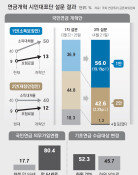[Editorial] Better FX Policy Needed
Investors may heave a sigh of relief as the weakening won has started to rebound against the U.S. dollar. Government intervention to prevent the Korean currency from falling further has cost more than 20 billion dollars in foreign reserves. This unnecessary mishap requires a review of foreign exchange policy.
If authorities believe fluctuations of the won should be prevented whenever possible, they should think again whether this concept fits the global economic system. The won-dollar rate represents the relative value of the two currencies, a useful measure that reflects the economic conditions of both countries. An oscillating won-dollar rate, however, is not an economic disaster by itself. Authorities should know that their hasty efforts to tame fluctuations unintentionally create a ripe environment for foreign capital flight out of the country.
The current account deficit over the first eight months of the year was 12.5 billion dollars, so a falling won is inevitable. The plunge in the Korean currencys value has been brought on by the structural vulnerability of the foreign exchange market, rather than from weak fundamentals of the economy. To tackle this situation, government policy should maximize the positive aspects of a weakening won while minimizing side effects.
With the global credit crunch casting a cloud over advanced economies, a weaker won can help increase Koreas price competiveness to boost exports. In addition, Koreans will be deterred from spending abroad due to a weaker currency. A strong dollar that boosts exports and limits unnecessary overseas trips could draw rein in the runaway foreign exchange rate.
Opening value-added service sectors such as education and medicine to strengthen competitiveness on the global stage is another important foreign exchange policy. If major economic and financial participants join hands to attract more tourism in the country, it will greatly raise domestic consumption.
Former Bank of Korea Governor Park Seung said, We have to make efforts to stabilize the foreign exchange rate through indirect measures such as export growth, import restraints, free flow of foreign capital, prevention of foreign capital flight, and a frugal domestic budget. With the financial market apparently back on its track, his comments deserve heed by government authorities.







